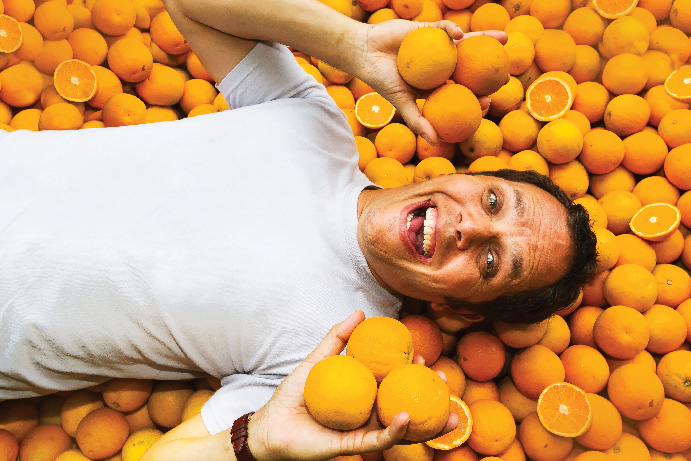Between cooking for weddings, appearing on television and at food festivals, and running his business, Al’FreshCo, Belfast-born, Brisbane-based celebrity chef Alastair McLeod was kind enough to let us into his picture. Alastair details why he has never been happier as a cook, the importance of getting to know our farmers, and why the food he creates is “a love letter to our backyard”. Interviewed by Kaitlyn Gutzke.
What are you up to at the moment?
On a professional level, my focus is private catering. I have a catering business called AlFreshCo … it’s a small business, but I have never enjoyed my cooking so much because for many years I was in restaurants and I was really a manager of food. We’ve had upwards of hundreds of staff and maybe 2030 chefs, so really, your job is just to marshall the troops and manage the business, the costs, all the moving parts, so now to be doing a business where I can go back to my core skills – it’s brilliant. It’s a real sort of epiphany for me.
I am the also food person on the Great South East which is on Sundays at 5.30pm. It is a wonderful opportunity for me, in many respects, it offers more synergy for me than Ready Steady Cook did, in the sense that I am visiting primary producers from around Queensland, and that is – these people are good to be around, these primary producers, generally speaking, are not driven by remuneration. They have this unerring passion for their jobs, and it makes you cook with more care.
If you have met the farmer who has raised the cattle, or met the man who made the cheese, or the woman who has grown the Dutch cream potatoes, you really feel a real sense of duty not to stuff it up, a real sense of duty to make that potato taste the very best it should be.
There are statistics that say we are importing half our fruit and vegetables in Australia, we’re importing up to 70 per cent of our seafood – that is appalling. There are stats that say the average shopping trolley is full of tinned items – tin of chickpeas, tin of tomatoes, packet of spaghetti, it has done two Jessica Watson trips – 70,000kms, to get into our trolleys and that’s wrong.
You seem to be very passionate about fresh and local produce. Do you encourage other chefs, as well as home cooks, to use fresh produce and even grow their own food in their backyards? I think there’s a lot of reality checks there, challenges and restraints on our lives. I don’t grow my own carrots, I am going to leave that to someone who knows how to work the soil to make the dirt soft enough so the carrot grows down into the ground. But I grow my own herbs, I can’t remember the last time I bought rosemary, thyme, oregano, dill, sage, fennel, basil – and that’s just looking down into our garden – and it feels nice, there’s a real feel-good there, but there’s no excuse really.
My mum lives on our property in a separate dwelling, and she grows her herbs and she is not a green thumb. I think this whole notion of food miles, securing our foods future, there are statistics that say by 2050 the world will need to produce twice as much food. Where are we going to produce all this food? On as little as an acre, you can grow a prodigious amount of fruit and vegetables. and if anything else, it is just fun.
We did a dish – there’s a French toasted sandwich called a croquet-madame, and we changed it to a croque madman. We used butter from a Gympie farm, we used ham that we got from Leyburn, cheese from Eudlo on the Sunny Coast, we got eggs from the Darling Downs – it was just this real love letter to our backyard. It was this whole sense of provenance, of time and place, and you go ‘oh, a bloody cook doing a market, that’s a bit of a step down’, but I loved it.
Cooks seem to be reinventing classics dishes in the latest trend to hit our plates. Do you think chefs should be messing with the classics, or should they be experimenting and coming up with brand new concepts? I think it’s okay that there is a bit of fashion with food.
In terms of reinventing dishes, I expect there to be hits and misses, as there will be from everything. We have people from different eras saying the music isn’t the same as it used to be, they don’t build cars like they used to, and all that sort of thing. Change is fine, what do they say – you rest you rust – I always look forward and never look back and you can get a bit nostalgic, but really, cooking is a simple craft, it is not a skill, it is a craft that everyone should have.
To cook well, you just have to want to cook well. That’s one part of it, and the other part is … if you start with crap ingredients, you won’t end up with something really impressive. It all comes back to respect for produce and for me, respect for produce goes hand in hand with knowing where it is coming from, because if I know that it has been grown close to home, it will taste better.
If you have met the farmer who has raised the cattle, or met the man who made the cheese, or the woman who has grown the Dutch cream potatoes, you really feel a real sense of duty not to stuff it up.
That is the cornerstone of cooking, and after that you have to understand textures and flavours and combining temperatures, and understanding the aesthetics of a dish – and that’s it. But it has to come back to the ingredients, not the chef.
My mum is 77 and she cooks for herself every night, and we do a lot of her shopping and she cooks fresh food every night. My wife is vegetarian … generally speaking take you longer to cook a vegetarian meal than it would to grill a chicken breast on the barbecue and open a bag of salad. But I would refuse to spend more than half an hour in the kitchen, and dirty more than two pots, and it’s not because I am a chef of considerable repute, it is because there is no need to make it complicated – you can make food sparkle and sing without fuss and flamboyance.
Who does the cooking in your household? I do. My wife is a great cook, an amazing cook. It is really interesting cooking for a vegetarian, understanding the extraction of flavour to get the best out of the vegetable – you’ve got to think a bit more. But I do the cooking thanks, and the washing up.
You have cooked around the world, especially throughout Europe, what is your favourite cuisine to cook? Or what cultural influences do you use in your cooking? I would say, just like you in your industry, for a painter, a candlestick maker, you are the sum of your parts. When I worked in France, I didn’t really like cooking up until then and I had been cooking for five years, that was really the epiphany for me, that whole motion of provenance – the French are really about using only the produce from the area they’re in, and they take it a step further and they only cook dishes from that region using the produce from the region.
And they have that real sense of tradition and of respect, I find it a wee bit restrictive, coming from Ireland. What I got from them, is that there is no correlation between how tricky a dish is and how delicious it is. And it takes ages, as a professional cook, it takes ages to work that out. You feel you need to show your skills and technique – no you don’t – you just need to make it taste delicious, that’s your duty as a cook. It doesn’t matter who you are, whether you are cooking at home – I would apply myself just the same at home as my mother has subliminally taught me.
It’s about what food fosters at the table, you know, food is a real conduit for family, for big picture stuff – there’s no doubt about it. It brings people together.
My mum, she would still talk about my nanna – she lived just shy of her 101st birthday – and my mum would still talk of her passion for food and kitchen for feeding, for family, for love. I was up with my wife in the Torres Strait, my grandfather was born Darnley Island in the Eastern Torres Strait, we went up there and where my mum gets this (she’s never been), but you see where she gets that sense of generosity. It is an extraordinary part of the world.
Did you get your passion for food and cooking from your mother? There is no doubt, the smells that came out of our house where I grew up weren’t the same coming out the other people’s houses in the street. My mother, she’s got a mellifluous honey caramel voice – she was a jazz singer – she’s a big woman in every way – and she cooked lustily. She was synthesising the food of her inheritance, my Nanna, who was born in Mackay, she was Sri Lankan and Filipino and my grandfather was born up in Darnley Island and his folks were Spanish and Danish – I might not have got that right, the other way around I think – but this extraordinary melting pot. This is an era, this is early last century, people didn’t go out for dinner they always cooked, they understand food, they understand how to make food extend, and they are all lovely things, they make me feel really good.
So, it definitely comes from her, specific dishes probably not, but that enthusiasm, and that desire to please.
Any last words? I’ve always been conscious of respecting my elders, and also, I can hear my mother now saying ‘don’t teach your mother how to suck eggs’. I think maybe on the inside I am older than I am, and I sort of… I liked the world better when I was younger, when my folks were bringing me up, I wish I knew then what I know now.
When I think about, on a personal level, people that I cook for, there is plenty to be done, there is plenty of food to be eaten, plenty of places to visit – I am looking forward to being retired, I can’t wait. I’m a cook though – it won’t be until I’m 80.
…you can make food sparkle and sing without fuss and flamboyance.























